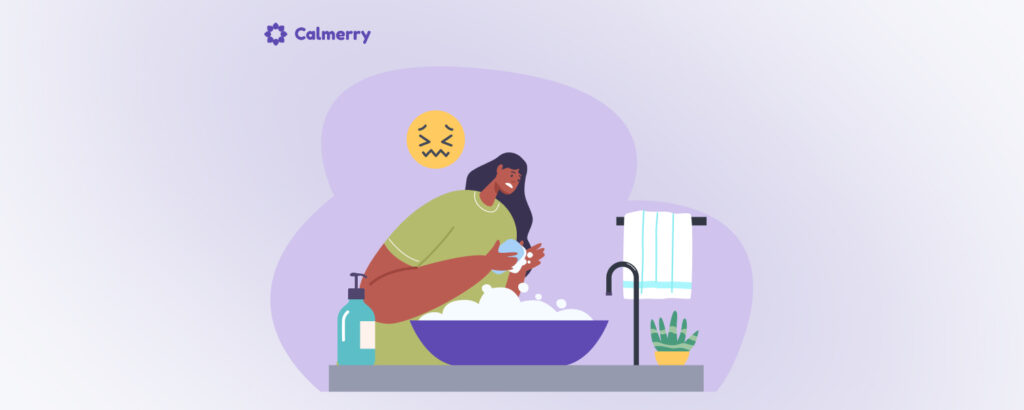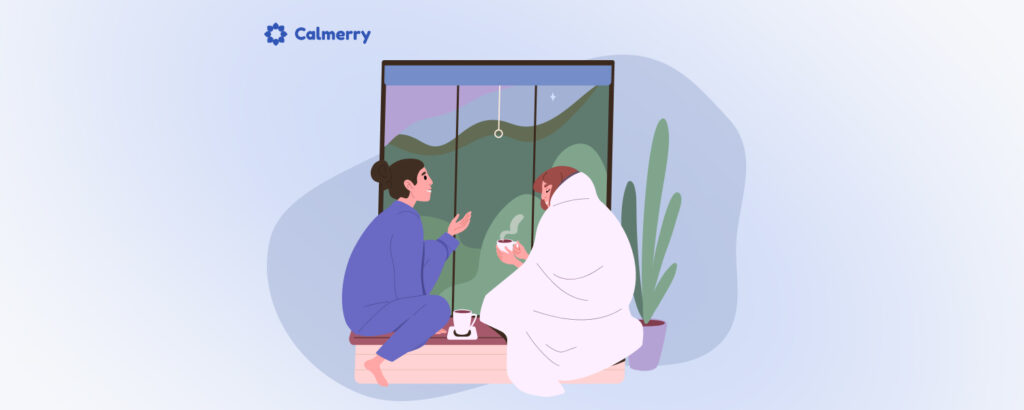What Is Obsessive-Compulsive Disorder (OCD)?
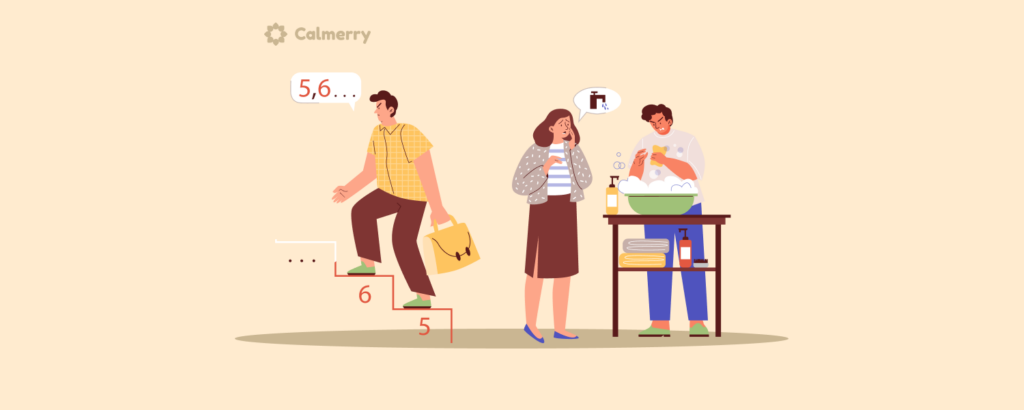
Table of Contents
Obsessive-compulsive disorder (OCD) is a complex, real mental health condition that causes obsessive thoughts and compulsive behaviors, which are unwanted, distressing, and repetitive.
The recent statistics of 2023 indicate that about 2.3% of the population has OCD. [1] Obsessive-Compulsive Disorder (OCD). (n.d.). National Institute of Mental Health (NIMH). https://www.nimh.nih.gov/health/statistics/obsessive-compulsive-disorder-ocd
OCD symptoms can sometimes appear during childhood. But more often, it develops during early adulthood. OCD can significantly impact the lives of those affected, including their work life, social life, and overall well-being.
OCD affects all genders equally but can present in many ways. Unfortunately, OCD can worsen over time if left untreated. That’s why seeking help is essential because effective treatments are available.
This article will look at what OCD is, its symptoms, causes, the best treatments, and some self-help techniques you can try.
What is OCD?
OCD is a mental health condition that has two components:
- Obsessions – unwanted or disturbing thoughts, visualizations, or urges that repeatedly arise in your mind, causing anxiety and unease. When they appear, it’s hard to think of anything else.
- Compulsions – repetitive behaviors you feel you must do to relieve the anxious feelings caused by obsessive thoughts. Compulsions could be physical acts, such as checking something is locked, or mental rituals, like checking how you feel.
OCD is not just about being neat or having to do things your way. It’s an inability to stop intrusive thoughts or doing things you don’t want to do. It makes you feel powerless and afraid that there will be consequences if you don’t do something a specific way.
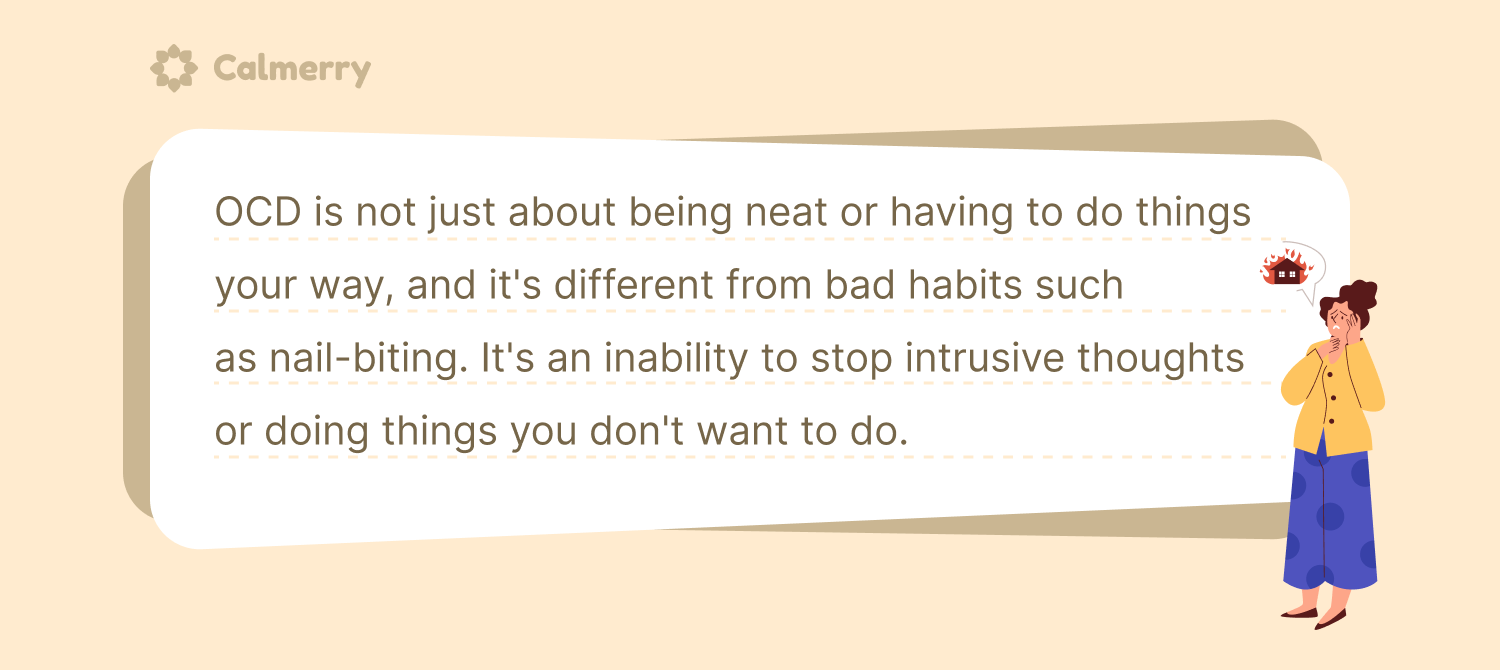
We all experience negative thoughts and can develop bad habits occasionally, but this is not the same as OCD.
The obsessions or compulsions that come with OCD usually take up more than one hour per day, are very unpleasant, make day-to-day life difficult, and are uncontrollable.
Is OCD an anxiety disorder?
OCD was traditionally grouped with anxiety disorders due to the significant anxiety experienced by those affected. However, according to the Diagnostic and Statistical Manual of Mental Disorders, Fifth Edition (DSM-5), the latest classification places OCD in its own category of “Obsessive-Compulsive and Related Disorders.“ [2] Stahnke, B. (2021). A systematic review of misdiagnosis in those with obsessive-compulsive disorder. Journal of Affective Disorders Reports, 6, 100231. https://doi.org/10.1016/j.jadr.2021.100231
This change reflects a deeper understanding of the unique features and underlying mechanisms of OCD compared to other anxiety disorders.
The relationship between OCD and anxiety is nuanced. While not classified as an anxiety disorder in the DSM-5, the experience of anxiety is a central aspect of OCD. And individuals with this condition often find their symptoms worsened during periods of heightened stress or anxiety.
However, OCD encompasses a spectrum of symptoms and mechanisms, extending beyond the realms of anxiety disorders. [3] Brock, H. (2023, May 29). Obsessive-Compulsive Disorder. StatPearls – NCBI Bookshelf. https://www.ncbi.nlm.nih.gov/books/NBK553162/#_article-26069_s8_
Types of OCD
OCD presents and affects people in various ways. But there are five main categories, and the majority of cases usually come under the following:
Contamination
A constant, overwhelming need to be clean and a fear that things you touch could be dirty. Some may feel an internal sense of contamination when others wrong them or “treat them like dirt.”
Checking
Needing to repeatedly check for problems, such as unlocked doors or windows, light switches, domestic appliances, and alarms. This also includes checking oneself for physical or mental illness and checking communications like emails for mistakes.
Symmetry and ordering
Needing to arrange objects or organize things a certain way due to fear of harm or to relieve anxiety.
Rumination and intrusive thoughts
Feeling unable to stop repetitive, undesired thoughts. These obsessive thoughts could be violent, sexual, blasphemous, and more, causing intense distress.
For example, those with OCD who experience intrusive thoughts could incessantly think about a loved one’s death.
Hoarding
Needing to keep or collect things you may not want and feeling unable to throw away unneeded items. These items often have very little monetary value to others but have significant emotional value to those who hoard them.
Within or overlapping these five main categories, there are infinite potential variations of OCD. It can fixate on any thought, subject, or fear and often important things to you, such as religion or relationships.
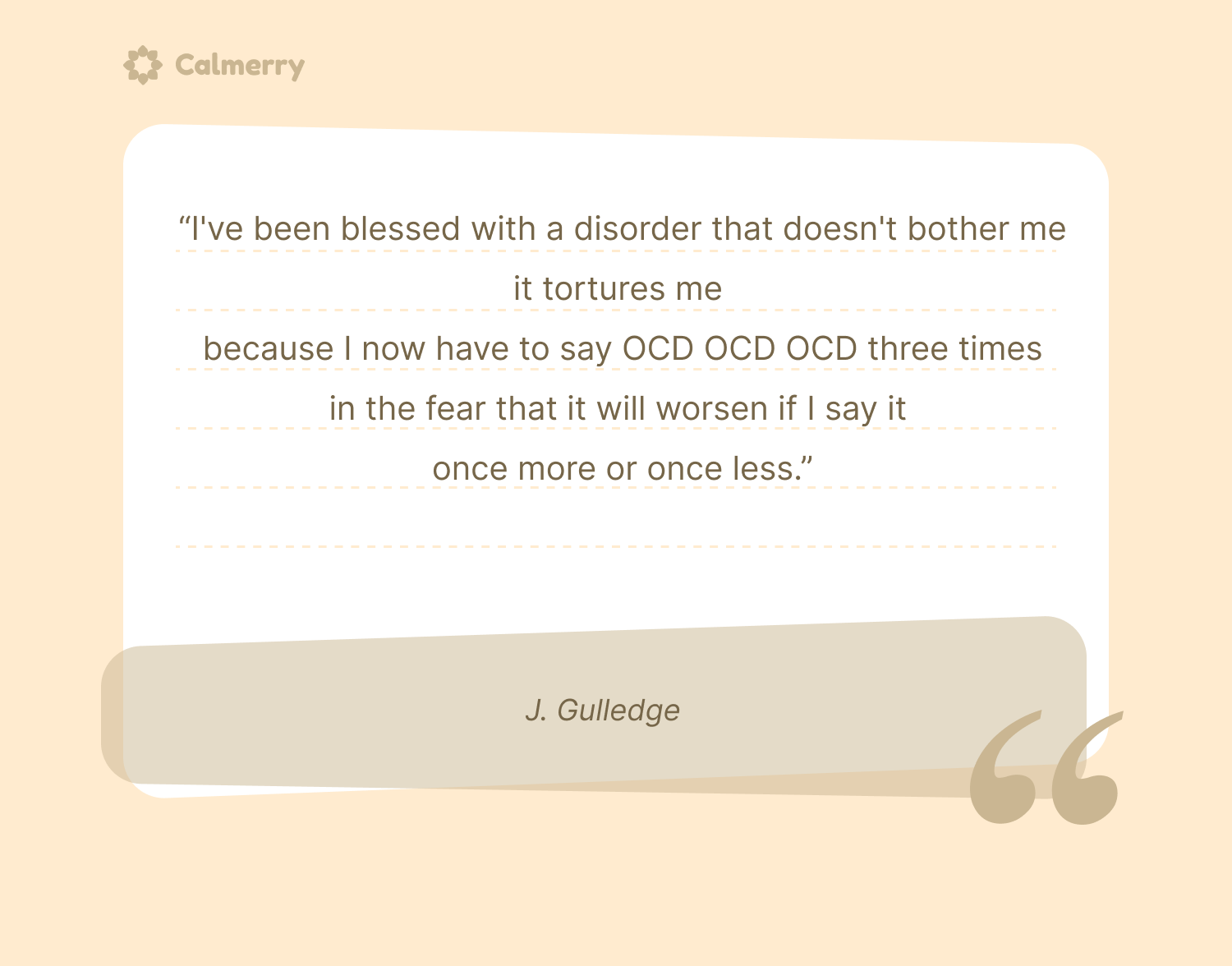
Symptoms of obsessive-compulsive disorder
With OCD, the main symptoms you have are obsessions, compulsions, or both, which cause distress and negatively affect your quality of life.
Here are some common examples of obsessions and compulsions that people with OCD may experience:
Obsessions
Obsessive thoughts and associated symptoms may involve:
- Feeling dirty or worrying about hygiene, germs, and illness.
- Worrying your actions have already harmed someone or you could lose control and harm someone in the future.
- Having disturbing visualizations of yourself doing something abusive, sexual, or violent.
- Believing bad things will happen if you don’t organize items a certain way.
- Worrying that if you throw something away, it could cause harm.
- Feeling guilty, ashamed, disgusted, or disturbed by your thoughts.
Compulsions
Compulsive habits and associated symptoms may include:
- Excessively cleaning yourself or items around you, checking things for contamination, and avoiding things you feel might be dirty.
- Checking your memory or reviewing past actions to make sure you didn’t cause someone harm.
- Repeating a phrase, counting, or performing mental rituals to deal with intrusive thoughts.
- Organizing items the “right way” to avoid bad things from happening.
- Repeatedly checking your possessions to make sure you haven’t lost or thrown anything away.
- Regularly seeking reassurance and needing others to tell you everything is OK.
People with OCD may try to ignore their symptoms, cope alone, or control their thoughts and behaviors. But generally, they will find it very difficult to do, and improvements can be short-lived as they usually keep coming back without proper treatment.

Obsessive-compulsive disorder causes
It’s not known what causes people to have OCD, but it’s believed that various factors may play a role, including:
Environmental factors
OCD is more common in people who have experienced abuse, trauma, or prolonged stress. Significant life events may also trigger OCD in some people, such as injury, grief, or childbirth.
Family history
You’re more likely to have OCD if someone in your family also has it. Genes may play a role. But people can still develop OCD even if no one in their family has it.
Personality
Having certain personality traits, such as being meticulous, methodical, and neat; or being highly anxious and having a lot of responsibility, could make you more likely to develop OCD.
Brain differences
People with OCD can have lower levels of the neurotransmitter serotonin or impaired function in some parts of the brain.
Neurodevelopmental factors
There’s a theory suggesting that OCD might develop due to how the brain grows and changes. This theory is supported by the fact that people with OCD often also have Tourette’s syndrome, another condition believed to be related to brain development. [4] Rosenberg, D., & Keshavan, M. S. (1998). Toward a neurodevelopmental model of Obsessive–Compulsive Disorder. Biological Psychiatry, 43(9), 623–640. https://doi.org/10.1016/s0006-3223(97)00443-5
Autoimmune factors
There’s a condition called PANDAS, which is short for Pediatric Autoimmune Neuropsychiatric Disorders Associated with Streptococcal Infections. In simple terms, some kids suddenly show OCD symptoms or tic disorders (like sudden, rapid, repetitive movements or sounds) after getting infections like strep throat or scarlet fever. [5] Endres, D., Pollak, T. A., Bechter, K., et al (2022). Immunological causes of obsessive-compulsive disorder: is it time for the concept of an “autoimmune OCD” subtype? Translational Psychiatry, 12(1). https://doi.org/10.1038/s41398-021-01700-4
Can OCD go away?
OCD doesn’t usually go away on its own. However, treatment can help manage symptoms. And in some cases, individuals might experience periods where symptoms lessen or are easier to manage.
Yet, it’s important to note that while some people might find that their symptoms go away almost completely with effective treatment, others might continue to experience some symptoms, though usually less severe.
Treatments for OCD
The treatments available for OCD can be effective, helping you manage symptoms and improve your quality of life.
Before treatment is given, a doctor will ask about your symptoms, thoughts, and behaviors so they can make an accurate diagnosis. Then, they may perform a blood test or physical exam to check if anything else could be causing your symptoms.
The two main treatments for OCD are:
Psychotherapy
For example, Cognitive behavioral therapy helps you confront your obsessive thoughts in a safe space and learn how to manage them without acting out compulsions.
Exposure therapy is a specific type of CBT that aims at exposing oneself to the stimuli that cause distress and fear while confronting the compulsions.
Online therapy offers the flexibility to undergo these treatments from the comfort of your home, broadening access to trained professionals. Especially with the rise in digital health platforms, patients now have more options to seek therapy sessions for OCD online.
Medication
Selective serotonin reuptake inhibitors (SSRIs), which are a type of antidepressant, increase serotonin levels in the brain.
Medication is usually given alongside psychotherapy.
Other treatments for OCD include:
- TMS (transcranial magnetic stimulation) – a non-invasive device that uses magnetic fields to stimulate the brain to improve symptoms of OCD.
- Neuromodulation – a procedure that involves implanting electrodes in your brain, which stimulate nerve cells.
- Relaxation techniques – breathing exercises, massage, yoga, meditation, guided imagery, and other relaxation techniques can reduce stress and improve symptoms of OCD.
How to cope with obsessive-compulsive disorder
While the most effective way to treat OCD is to seek professional help, there might also be some ways you can help yourself.
Not all of these things will work for everyone, but here are some self-help techniques you can try that can improve your well-being and might help you cope with your OCD.
Seek support from others
Stigma and other factors can make it difficult to talk about OCD. Still, if you can share your experiences with someone trusted, such as family or friends, it can provide valuable emotional support, counter loneliness, boost morale, and help you cope.
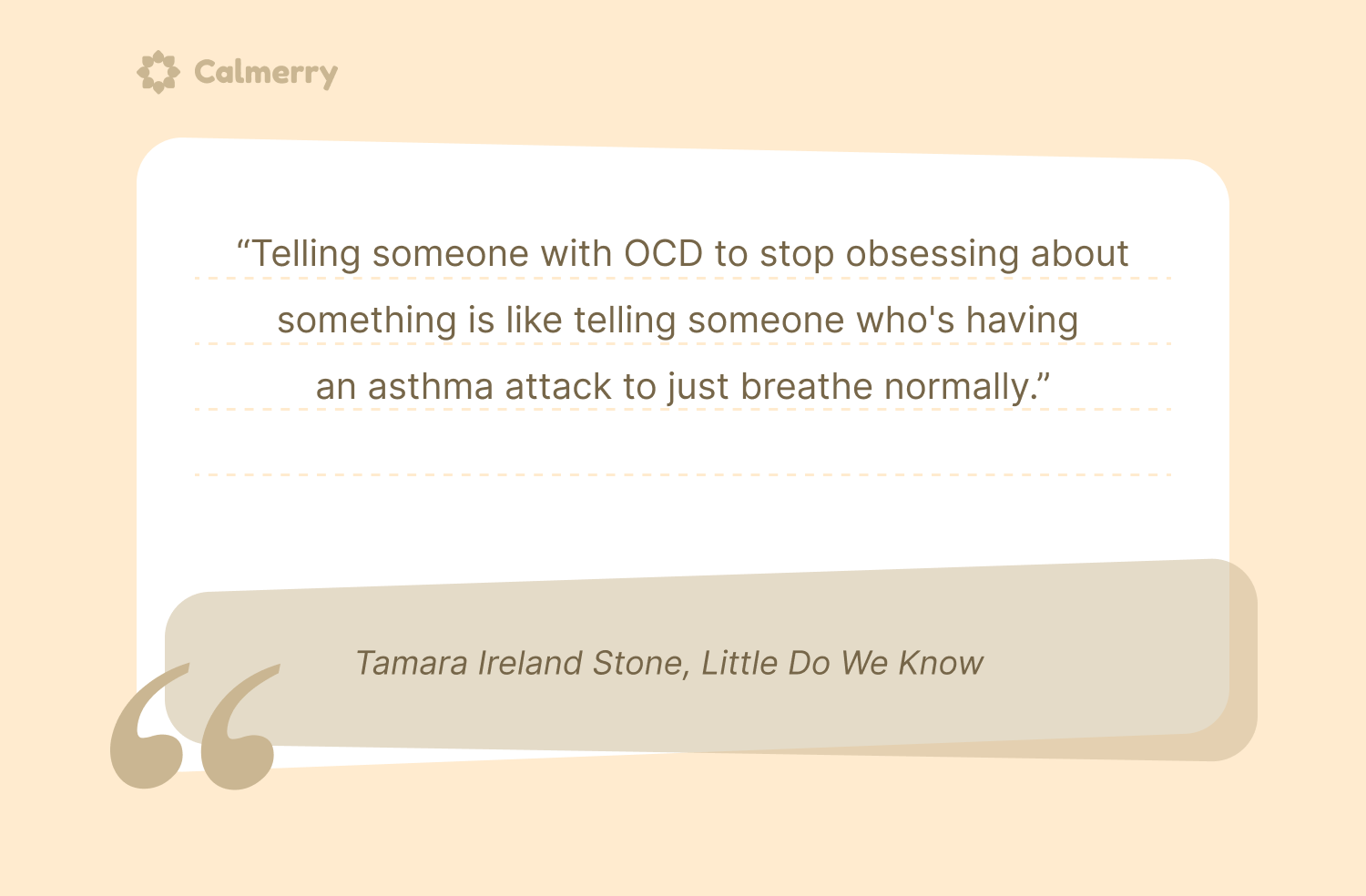
Read self-help books for OCD
Books based on CBT and written by medical experts can help you better understand OCD and offer advice on how to apply CBT techniques. Knowledge is power, and these practical guides can help you develop effective coping strategies for OCD.
Here are some of our picks:
- “Freedom from Obsessive Compulsive Disorder: A Personalized Recovery Program for Living with Uncertainty” by Jonathan Grayson, Ph.D.
- “Obsessive-Compulsive Disorder Demystified: An Essential Guide for Understanding and Living with OCD” by Cheryl Carmin.
- “Stop Obsessing!: How to Overcome Your Obsessions and Compulsions” by Edna B. Foa, Ph.D., and Reid Wilson, Ph.D.
- “The Mindfulness Workbook for OCD (New Harbinger Self-Help Workbooks)” by Jon Hershfield, MFT
- “Overcoming Obsessive-Compulsive Disorder: A self-help guide using cognitive-behavioral techniques” by David Veale and Robert Willson.
- “OCD: A Guide for the Newly Diagnosed” by Michael A. Tompkins.
Practice mindfulness
Meditation and other mindfulness exercises can help reduce anxiety and stress and boost focus and self-compassion.
Therapists often incorporate elements of mindfulness when treating someone with OCD.
Have a healthy lifestyle
Physical activities like yoga, walking, going to the gym, and playing sports can improve mental health.
Eating healthily and getting enough sleep are also important parts of self-care, which can improve well-being, boost energy, and help you cope.
Get help with OCD on Calmerry
OCD affects people of any gender and age, and its symptoms can present in countless ways. But no matter how it presents and whether it’s mild or severe, the right treatments can help most of the time.
However, when OCD is left untreated, it can worsen over time, so please seek professional help if it’s affecting you.
If you’d like to talk to someone about your OCD in a safe space, our online therapists here at Calmerry are always available. They specialize in helping people overcome OCD and only use the most effective evidence-based approaches.
Start with a brief survey and get matched with your therapist within 1 hour.
Obsessive-Compulsive Disorder (OCD). (n.d.). National Institute of Mental Health (NIMH). https://www.nimh.nih.gov/health/statistics/obsessive-compulsive-disorder-ocd
Stahnke, B. (2021). A systematic review of misdiagnosis in those with obsessive-compulsive disorder. Journal of Affective Disorders Reports, 6, 100231. https://doi.org/10.1016/j.jadr.2021.100231
Brock, H. (2023, May 29). Obsessive-Compulsive Disorder. StatPearls – NCBI Bookshelf. https://www.ncbi.nlm.nih.gov/books/NBK553162/#_article-26069_s8_
Rosenberg, D., & Keshavan, M. S. (1998). Toward a neurodevelopmental model of Obsessive–Compulsive Disorder. Biological Psychiatry, 43(9), 623–640. https://doi.org/10.1016/s0006-3223(97)00443-5
Endres, D., Pollak, T. A., Bechter, K., et al (2022). Immunological causes of obsessive-compulsive disorder: is it time for the concept of an “autoimmune OCD” subtype? Translational Psychiatry, 12(1). https://doi.org/10.1038/s41398-021-01700-4
-
Learn morePersonalized online therapyChoose video, messaging, or both to fit your schedule and comfort. Get matched with your therapist within 1 hour.
-
Learn moreOne 60-minute live video sessionSee how online therapy works and get quick support with a single therapy session. No commitments.
